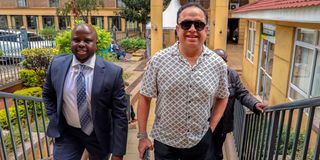Triton oil scandal: Court dismisses bid to quash Devani's release

Businessman Yagnesh Devani and his lawyer Hillary Kiplagat at the Milimani Law Courts Nairobi on February 12, 2024.
The High Court has dismissed an application to quash the release of businessman Yagnesh Devani and discharge of his company Triton Petroleum Company Limited from the Sh7.6 billion oil corruption scandal.
Justice Lucy Njuguna said on Thursday that the application filed by Mr Devani's former co-accused in the criminal case, Mr Peter Manono Mecha, seeking a review of the lower court's decision, lacked merit.
Mr Devani was discharged from the corruption case in October last year after the State failed to produce witnesses in court, some of whom had since died. Other key witnesses had been uncooperative and unwilling to appear in court.
Mr Mecha wanted the Anti-Corruption Court judge to overturn the lower court's decision and reinstate the fraud charges. He argued that the Director of Public Prosecutions (DPP) was shielding Mr Devani from accountability for the scandal.
He added that the process of dropping the charges against the businessman was irregular and prejudicial to the other accused persons.
But Justice Njuguna ruled that the court had not stumbled in granting the State's application to withdraw the case.
“Considering the reasons that the court was given for the withdrawal, in my considered view, the trial court did not err in allowing the withdrawal of the case,” said the judge.
She rejected Mr Mecha’s argument that it was wrong for the trial court to allow the withdrawal of the charges in the absence of the other four accused persons -- Mr Mecha, Mahindra Pathak, Benedict Mutua and Phanuel Okwengu.
“The applicant has contended that the withdrawal of the charges in his absence undermines his right to a fair trial and his ability to present a complete and coherent defence that addresses the actions and intentions of all the individuals involved. Unfortunately for them, this is not one of the parameters that the court is under duty to consider under Article 157(11) of the Constitution,” said justice Njuguna.
The said the provision of the Constitution states that in the exercise of his powers, the DPP shall have regard to the public interest, the interests of the administration of justice and the need to prevent and avoid abuse of the legal process.
Mr Devani, the director of Triton Petroleum Company Limited, was accused of stealing more than 321,000 tonnes of jet fuel, automotive gas oil and premium motor spirit from Kipevu Oil depot in Mombasa in 2008. The stolen flammable petroleum products belonged to Kenya Commercial Bank.
He had been on the run for 16 years and was extradited from the UK in January 2024.
The long-running anti-corruption case began in 2009. Mr Mecha said the prosecution had been hampered by the absence of Mr Devani, who has been absconding since 2010.
Upon being expatriated, he was charged in the absence of the other accused persons, a development Mr Mecha said was "highly irregular and prejudicial to the interests of other co-accused persons".
The DPP also made the withdrawal application in their absence.
He contended that the co-accused were not given a fair opportunity to object or respond to the DPP's application, despite the fact that they were jointly charged with conspiracy to defraud.
Mr Mecha emphasised that the arbitrary separation of the accused on a conspiracy charge violated procedural fairness and undermined his right to a fair trial.
This was because the remaining accused were subjected to the full weight of the prosecution's case without the benefit of a full investigation of all alleged participants.
Mr Mecha said this was a serious violation of their fundamental right to a fair trial, as the cornerstone of the criminal justice system is the right to be heard. The withdrawal of the charges came while the case was pending a decision on a "case to answer".
“The prosecution has exhibited a disturbing pattern of withdrawing charges, particularly against crucial witnesses to the prosecution’s case, which conduct is clearly designed to undermine the integrity of the judicial process and to shield Mr Devani from accountability,” he stated.
However, in dismissing the application, the judge noted that Mr Devani and his company had not entered a plea in the case, that they had not attended the hearing and that the case had reached the stage of "a case to answer".
On Mr Mecha's complaint that the case was being tried in their absence, the judge said Mr Devani was produced before a different magistrate because the trial court was not present.
“Since he was taken to court under a warrant of arrest, which had been in force for 16 years, it is reasonably expected that the other accused persons would not be in court on that date,” he observed.
The DPP had opposed the application, describing it as “misconceived and unsubstantiated” and that the corruption charges were properly withdrawn under the Criminal Procedure Act and the Constitution.
The DPP said he had the discretion to withdraw the case and that Mr Mecha’s application was an abuse of the court process.
“There is no provision under law enabling the applicant to move the court by way of application seeking orders for reinstatement of charges withdrawn by the DPP against him,” the court heard.


